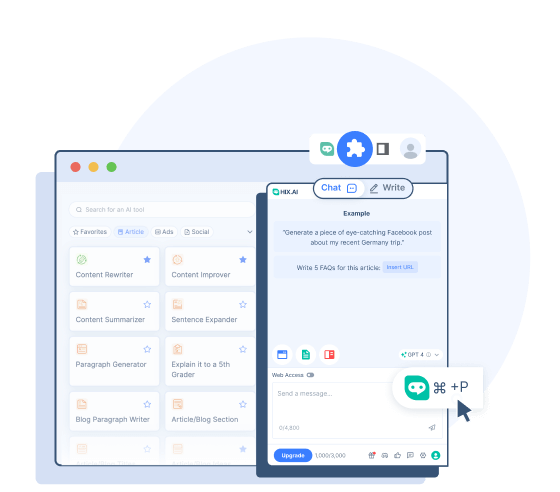Received an interview invite, but your plans have changed? Learn how to say no like a pro with our guide on how to decline an interview via email. Declining an interview is a bold move, but in business, you have to do what's right for you. The secret to protecting your professional reputation, maintaining relationships, and keeping the doors open for future possibilities. How?
Read our guide to find out!
We explain the correct email format to politely decline an interview, provide some pro tips from the experts at HIX.AI, and provide 5 emails samples covering the following:
- Declining an interview after accepting another offer
- Declining an interview due to personal reasons
- Declining an interview due to insufficient compensation
- Declining an interview because of job culture or clashes
- Delining an interview to remain in current role
We can kick off by explaining why you should decline an interview by email (not simply ignoring it!).
Effortlessly Craft Your Email with AI Assistance
Before we explore our manual examples, take advantage of our free AI email generator to effortlessly create a professional and polite interview declination email with just a few clicks.
Why decline an interview via email?
There are many reasons why you might want to decline an interview (you've been offered a better job, decided to stay put, etc.). But, whatever the reason, you must let the company know. Why? Because it's the professional thing to do. The company you’ve applied to wants to find someone to do the job, and they’ve invested time and faith in inviting you to an interview.
If you’ve decided not to attend an interview, always let the organization know. And do this as soon as you can so they have a chance to make alternative plans. If you don’t, you could embarrass yourself and harm your future chances of finding a job.
While it may be easier to bury your head in the sand and delete the message, think about your career. Sending a well-written, positive, and polite email declining an interview will ensure your reputation stays intact.
Sending an email ensures you provide a written record of your communication. It also gives you the time to allows you to carefully construct your message.
Now you know why, let's dive into our five templates to help you navigate this tricky situation.
5 sample emails declining an interview
In these samples, we show you how to decline an interview in the most professional way. Each sample can be cut and pasted or used as inspiration for creating your replies.
Declining an interview after accepting another offer
This sample response shows you how to decline an interview if you have already accepted another job. This is a tricky situation; while you don't need to explain why, it's often a good idea.
Dear [Recipient's Name],
Thank you for considering me for the interview opportunity. I recently accepted another job offer that aligns more closely with my career goals and aspirations. Therefore, I regretfully have to decline the interview that was scheduled with your company.
I appreciate your understanding and apologize for any inconvenience this may cause. I am grateful for the opportunity and wish you the best in finding the right candidate for the position.
Thank you once again for considering me and for your time.
Best regards,
[Your Name]
Declining an interview due to personal reasons
Sometimes, life can get in the way of your career. If there are personal reasons why you have to decline an interview, it's your choice to say why. In most cases, the term "personal reasons" should be enough.
Dear [Recipient's Name],
I hope this email finds you well. I regret to inform you that due to personal reasons, I am unable to attend the interview scheduled for [date and time]. I apologize for any inconvenience caused, and I appreciate your understanding in this matter.
Thank you for considering me for the opportunity, and I would appreciate it if you could keep me in mind for any future openings that may arise.
Best regards,
[Your Name]
HIX Email WriterWrite/Reply to Emails Instantly
Type // to draft emails in no time
Get tailored replies with one click
Quickly summarize a received email
Read also: How to Decline a Job Offer via Email (16 Samples and FAQs Answered)
Declining an interview due to insufficient compensation
We work or the money, right? If the pay package isn't enough, then say so. As long as you do so fairly and transparently, the company can't complain. In some cases, they may offer to up the salary to match your expectations!
Dear [Recipient's Name],
Thank you for considering me for the [Position Name] role at [Company Name]. After careful consideration, I regretfully inform you that I am unable to proceed with the interview.
While I appreciate the opportunity, the compensation package offered does not meet my expectations. I believe my skills and experience warrant a higher salary.
I wish you the best in finding the right candidate for the position. Thank you for your understanding.
Best regards,
[Your Name]
Read also: How to Ask for a Raise via Email
Declining an interview because of job culture or clashes
This is a sensitive issue, and if you're going to decline an interview for this reason, you must be careful. There's no way you can avoid mentioning issues here but do so sensitively to protect you and your reputation.
Dear [Recipient's Name],
Thank you for considering me for the interview opportunity. However, after carefully assessing the job description and researching the company culture, I have concerns about potential clashes. As a highly valued candidate, I believe it would be unfair to engage in an interview process where I feel I may not fit culturally. I sincerely appreciate your time and consideration.
Best regards,
[Your Name]
Read also: How to politely decline an invitation via email (5 samples & templates)
Declining an interview to remain in current role
You could have had a promotion or a pay rise, and it's convinced you to stick in the role. If that's the case, say so upfront to avoid any issues.
Dear [Recipient's Name],
I hope this email finds you well. I am writing to inform you that, after careful consideration, I have decided to decline the interview opportunity for the [Job Title] position and remain in my current role.
I have recently been offered a promotion/pay rise in my current position, and upon further reflection, I believe it is in my best interest to continue in this role. I see great potential for growth and development within my current team, and I am excited about the new opportunities that lie ahead.
I appreciate your time and consideration throughout the interview process. I am grateful for the opportunity to have met with you and your team.
Thank you for your understanding.
Best regards,
[Your Name]
How to decline an interview – an essential guide
Declining an interview in an email means finding a careful balance. You must do what's best for your career but act professionally to protect your reputation. It’s easy to be defensive and apologetic, but there’s no need. Instead, you should be able to decline an interview and feel no need to say sorry.
How? By learning to say no like a pro! Here's the basic outline of an email declining an interview.
- Introduce yourself
- Express gratitude for the opportunity
- State clearly that you're declining the interview
- Provide a reason why (if you want!)
- Sign-off
This basic outline provides the essential elements of every message declining an interview. In fact, you can use this structure for any email declining something (an interview, job offer, or other opportunity).
In this guide, we'll show you how to build a message. It's all based on the formal email format, which has 3 parts:
- Subject line
- Body copy
- Sign-off/next steps
Ready to go? Let's start with the subject line!
Decline in job interview email subject line
Your subject line should state what your email is all about. In most cases, the person who receives it will simply record your decision and file it away, so be as clear as possible.
Let’s hit you up with some interview decline subject lines! (We know this isn’t grammatically correct, but we like the rhyme.)
- I am withdrawing myself from the interview process
- I must decline your interview
- I am unable to attend interview for (job title)
- Pulling out of the process for (job title)
- (Job title) – Declining the interview
- Unfortunately, I will not be able to attend my interview
- Dropping out of the process for (job title) position
The subject lines here should be shaped around your message and your reasons for dropping out of the process. Don’t copy and paste these before reading, reviewing, and editing them.
Decline in job interview email body copy
The subject line prepares the recipient for what they're about to read, but we still need to go through the process. It begins with a positive and personalized greeting ("Hi", or "Hello") and the person's name. Now, we build up the email with a positive opening to state what's happening.
"Thank you for inviting me to interview for the position of (job title). Unfortunately, at this stage, I am going to decline."
This is enough, but it's worth adding some context.
"I'm declining the interview because I have been offered an interview for an alternative position which I believe most closely suits my skills."
Decline in job interview email sign-off/next steps
We've pretty much said everything we need to, but you can express gratitude and wish them well with the process.
"Once again, thanks for inviting me to an interview. I hope this news doesn't impact your process or cause any problems. I wish you well in finding the right candidate."
Now you can sign off with your name and signature. If you want to keep up the communication, feel free to add your contact details (but it's not essential).
Say no like a pro without expert tips
Replying to an interview invitation is not easy, particularly when you need to say no. We know that and so do you. It’s probably why you’re reading this article. Here are some pro tips for saying no (but keeping your professional reputation intact and without damaging your relationship).
- Be positive when you message – and don’t apologize (unless you mean it). You’ve made the decision, now stand behind it. If you’re not sorry to drop out (because you’ve got another job or a pay rise in your current role), don’t apologize. State why you’re dropping out and move on.
- Keep a professional tone of voice and stay polite to avoid burning bridges. You never know when you’ll meet these people again, so don’t be rude, short, or sharp.
- Take the time to write a reply. Sadly, so many people find it easier to ignore messages without responding. That’s the cowardly way out. You’re better than that (we hope) so take the time to write back, and do so as soon as you can. This could enable someone else to take the opportunity.
- Proofread, check, and edit all emails so they’re 100% accurate. Spelling mistakes can make your messages look lazy, and we know you’re not like that.
- Let HIX.AI's AI email generator do the work. If you're struggling to find the right words, let our AI email writer do the hard work for you. This super powerful AI-writing assistant can create expert emails in seconds, all with the right structure and no issues or errors. Test it today!
Conclusion
Declining an interview in an email isn't easy, but if you’ve made the decision write the message.
You’re having to say no (which can be negative) but frame it in the most positive way. It's critical that you follow the professional email format outlined above and focus on the future. Express gratitude for the opportunity, explain your reasons why you're declining, and then sign off and move on!



